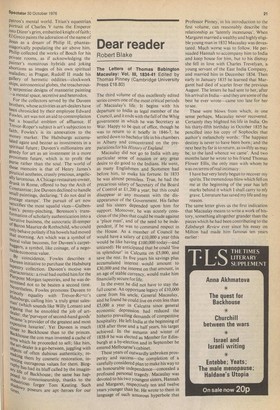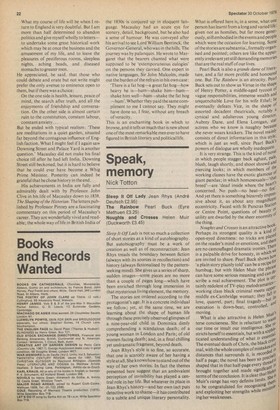Dear reader
Robert Blake
The Letters of Thomas Babington Macaulay: Vol. III, 1834-41 Edited by Thomas Pinney (Cambridge University Press £18.80)
The third volume of this excellently edited series covers one of the most critical periods of Macaulay's life. It begins with his departure to India as legal member of the Council, and it ends with the fall of the Whig government in which he was Secretary at War. Happy to be quit of office, though he was to return to it briefly in 1846-7, he settled down to bachelor life in his chambers in Albany and concentrated on the preparations for his History of England.
Macaulay did not go to India with any particular sense of mission or any great desire to do good to the Indians. He went, as many Englishmen and Scotsmen had before him, to make his fortune. In 1833 he was almost penniless. True, he had the precarious salary of Secretary of the Board of Control at £1,200 a year, but this could disappear at any moment with the disappearance of the Government. His father and his sisters depended upon him for support. Moreover, he was acutely conscious of the jibes that could be made against a 'place man', and of the need to be independent, if he was to command respect in the House. As a member of Council he would have a salary of £10,000 a year (this would be like having £100,000 today—and untaxed). He anticipated that he could 'live in splendour' in Calcutta on £5,000, and save the rest. In five years his savings plus accumulated interest would amount to £30,000 and the interest on that amount, in an age of stable currency, would make him financially secure for life.
In the event he did not have to stay the full course. An opportune legacy of £10,000 came from his uncle, General Macaulay, and he found he could live on even less than £5,000 a year in Calcutta since general economic depression had reduced the hitherto prevailing demands of competitive hospitality. He left India at the beginning of 1838 after three and a half years, his target achieved. In the autumn and winter of 1838-9 he was elected as Member for Edinburgh at a by-election and in September he entered Melbourne's cabinet.
These years of outwardly unbroken prosperity and success—the completion of a carefully considered plan to make his way to an honourable independence—concealed a profound personal tragedy. Macaulay was devoted to his two youngest sisters, Hannah and Margaret, respectively ten and twelve years younger than he. He wrote to them in language of such amorous hyperbole that
Professor Pinney, in his introduction to the first volume, can reasonably describe the relationship as 'latently incestuous'. When Margaret married a wealthy and highly eligible young man in 1832 Macaulay was devastated. Much worse was to follow. He persuaded Hannah to accompany him to India and keep house for him, but to his dismay she fell in love with Charles Trevelyan, ayoung servant of the East India Company, and married him in December 1834. Then early in January 1835 he learned that Margaret had died of scarlet fever the previous August. The letters he had sent to her, after his arrival in India—and they are some of the best he ever wrote—came too late for her to see.
These were blows from which, in one sense perhaps, Macaulay never recovered. Certainly they blighted his life in India. On his thirty-fifth birthday in October 1.835 he pencilled into his copy of Sophocles that author's melancholy words : 'The happiest destiny is never to have been born; and the next best by far is to return, as swiftly as may be, to the land whence we came'. And two months later he wrote to his friend Thomas Flower Ellis, the only man with whom he was on terms of real intimacy : I have but very lately begun to recover my spirits. The tremendous blow which fell on me at the beginning of the year has left marks behind it which shall carry to my grave. Literature has saved my life and my reason.
The same letter gives us the first indication that Macaulay means to write a work of history, something altogether grander than the pieces which he had been contributing to the Edinburgh Review ever since his essay on Milton had made him famous ten years earlier :
What my course of life will be when I return to England is very doubtful. But I am more than half determined to abandon politics and give myself wholly to letters— to undertake some great historical work which may be at once the business and the amusement of my life, and to leave the pleasures of pestiferous rooms, sleepless nights, aching heads, and diseased stomachs to greater men.
He appreciated, he said, that those who could debate and orate but not write might prefer the only avenue to eminence open to them, but if there was a choice: On the one side is health, leisure, peace of mind, the search after truth, and all the enjoyments of friendship and conversation. On the other side is almost certain ruin to the constitution, constant labour, constant anxiety ...
But he ended with typical realism: 'These are meditations in a quiet garden, situated far beyond the contagious influence of English faction. What I might feel if I again saw Downing Street and Palace Yard is another question.' Macaulay did not make his final choice till after he had left India. Downing Street still beckoned, but it is hard to believe that he could ever have become a Whig Prime Minister. Posterity can indeed be grateful that he chose history in the end.
His achievements in India are fully and admirably dealt with by Professor John Clive in his life of Macaulay down to 1838, The Shaping of the Historian. The letters published by Professor Pinney are a fascinating commentary on this period of Macaulay's career. They are wonderfully vivid and readable; the whole way of life in British India of
the 1830s is conjured up in eloquent language. Macaulay had an acute eye for scenery, detail, background, but he also had a sense of humour. He was conveyed after his arrival to see Lord William Bentinck, the Governor-General, who was in the hills. The journey was by palanquin. He wrote to Margaret that the bearers chanted what were supposed to be 'extemporaneous eulogies' on the persons they carried. One expert in native languages, Sir John Malcolm, made out the burden of the refrain in his own case: 'There is a fat hog—a great fat hog—how heavy he is—hum—shake him—hum- shake him well—hum—shake the fat hog —hum'. Whether they paid the same com pliment to me I cannot say. They might have done so. I fear, without any breach of veracity.
This is an enchanting book in which to browse, and it tells us much that is new about one of the most remarkable men ever to have figured in British literary and political life.



































 Previous page
Previous page